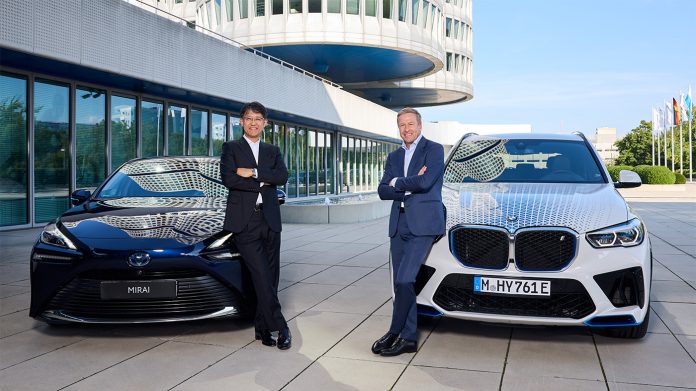Toyota and BMW's bold commitment to hydrogen fuel cells
As automakers push for sustainable mobility, Toyota and BMW are further committing to the development of hydrogen fuel cell technology. Hydrogen, often seen as a promising alternative to electric vehicles (EVs), presents several advantages that have both companies heavily investing in its future.
Hydrogen’s Edge Over Battery-Powered EVs
While EVs dominate the green vehicle conversation, hydrogen-powered vehicles have unique advantages. Unlike battery-electric vehicles, hydrogen fuel cell vehicles (FCEVs) have much faster refueling times—comparable to traditional gasoline cars—and can offer greater driving range. This positions FCEVs as a potential solution for long-haul transportation, where downtime for charging needs to be minimized.
Toyota, already a leader in this space with its Mirai model, and BMW, which is exploring hydrogen as an alternative to full electric, see hydrogen as complementary to battery-powered vehicles. Both companies argue that diversifying green technology is necessary to meet a wide range of transportation needs, from passenger cars to heavy-duty trucks.
A Strong Collaboration for a Cleaner Future
The collaboration between Toyota and BMW isn't new, but recent moves show a deeper commitment to hydrogen as a zero-emission fuel source. Both automakers have pledged to combine their engineering expertise and share technology to overcome key challenges in the widespread adoption of hydrogen fuel. This includes making hydrogen infrastructure more accessible and reducing the costs of producing and maintaining hydrogen-powered cars.
BMW has been actively testing its iX5 Hydrogen prototype, while Toyota continues to evolve its hydrogen fuel stack, refining the technology to improve performance and cost efficiency. Both automakers believe that hydrogen fuel cells can provide a reliable, long-range solution with minimal environmental impact, pushing beyond just personal transportation and into larger commercial vehicles.
The Road Ahead: Infrastructure and Acceptance
One of the primary obstacles to hydrogen adoption is the lack of refueling infrastructure. Despite the clear benefits, hydrogen refueling stations are scarce, especially compared to the rapid rise of electric charging networks. However, Toyota and BMW are working closely with governments and industry leaders to develop hydrogen refueling networks across major regions. In Europe, Japan, and parts of the U.S., hydrogen infrastructure is slowly expanding.
The push for hydrogen also aligns with broader sustainability goals, as nations worldwide look to decarbonize their transportation sectors. Hydrogen-powered vehicles could play a critical role, particularly in regions that prioritize renewable energy production and zero-emission targets. In this context, the Toyota-BMW partnership is significant, signaling a long-term commitment to shaping a hydrogen-powered future.
What This Means for the Automotive Industry
The joint efforts of these two industry giants mark a turning point in the debate over the future of green transportation. While battery-electric vehicles have garnered the most attention, hydrogen fuel cell technology offers a viable alternative for certain use cases, especially in long-range travel. By leveraging their resources and expertise, Toyota and BMW are positioning themselves as key players in the future of zero-emission mobility.
As hydrogen fuel cells become more efficient and cost-effective, the automotive industry could see a broader shift toward adopting this technology, alongside battery-electric powertrains. The next few years will be critical, as the Toyota-BMW partnership pushes forward the development of this innovative technology.
The collaboration between Toyota and BMW in advancing hydrogen fuel cell technology highlights the diverse paths automakers are exploring to achieve a sustainable future. While challenges like infrastructure remain, the combined efforts of these companies show that hydrogen is more than just a niche solution—it could be a key player in the global transition to cleaner energy.
Looking for a Greener Ride?
If you’re considering making the switch to a more eco-friendly vehicle, why not explore your options? Check out the Motorist app, where you can sell your current car, get a free valuation, and find the perfect green ride that suits your needs.
Read More: Surprising cars with BMW Engines: discover the hidden borrowers
I want to find the highest selling price for my car within 24 hours!
Download the Motorist App now. Designed by drivers for drivers, this all-in-one app lets you receive the latest traffic updates, gives you access to live traffic cameras, and helps you manage vehicle related matters.

